- Clone
- G043H7 (See other available formats)
- Regulatory Status
- RUO
- Other Names
- BLR2, CDw197, EBI1, CMKBR7
- Isotype
- Mouse IgG2a, κ
- Ave. Rating
- Submit a Review
- Product Citations
- publications

-

Chemotaxis of human CCR7-transfected BaF3 cells was performed in the presence of 15 ng/ml of recombinant CCL19. Addition of LEAF™ purified anti-human CCR7 (clone G043H7) inhibited migration of hCCR7 transfected BaF3 cells (ED 1.42 µg/ml).
| Cat # | Size | Price | Quantity Check Availability | Save | ||
|---|---|---|---|---|---|---|
| 353255 | 100 µg | 190€ | ||||
| 353256 | 1 mg | 551€ | ||||
CCR7, also known as CD197, is a chemokine receptor that binds CCL19 and CCL21. CCR7 and its ligands link innate and adaptive immunity by affecting interactions between T cells and dendritic cells and their downstream effect. Naïve T cells enter the lymph node through high endothelial venules, which express CCL21. Dendritic cells and macrophages enter the lymph node through afferent lymphatics. The encounter of T cells and dendritic cells in the T cell zone is CCR7-dependent. In addition, during immunological surveillance, B cells recirculate between B-cell-rich compartments (follicles or B cell zones) in secondary lymphoid organs, surveying for antigen. After antigen binding, B cells move to the boundary of B and T zones to interact with T-helper cells; this B cell migration is directed by CCR7 and its ligands. CCR7-positive cancer cell expression has been associated with lymph node metastasis.
Product DetailsProduct Details
- Verified Reactivity
- Human
- Reported Reactivity
- African Green, Baboon, Cynomolgus, Rhesus
- Antibody Type
- Monoclonal
- Host Species
- Mouse
- Immunogen
- CCR7-transfected cells
- Formulation
- 0.2 µm filtered in phosphate-buffered solution, pH 7.2, containing no preservative.
- Endotoxin Level
- Less than 0.01 EU/µg of the protein (< 0.001 ng/µg of the protein) as determined by the LAL test.
- Preparation
- The Ultra-LEAF™ (Low Endotoxin, Azide-Free) antibody was purified by affinity chromatography.
- Concentration
- The antibody is bottled at the concentration indicated on the vial, typically between 2 mg/mL and 3 mg/mL. Older lots may have also been bottled at 1 mg/mL. To obtain lot-specific concentration and expiration, please enter the lot number in our Certificate of Analysis online tool.
- Storage & Handling
- The antibody solution should be stored undiluted between 2°C and 8°C. This Ultra-LEAF™ solution contains no preservative; handle under aseptic conditions.
- Application
-
FC, Block - Quality tested
- Recommended Usage
-
Each lot of this antibody is quality control tested by immunofluorescent staining with flow cytometric analysis. For flow cytometric staining, the suggested use of this reagent is ≤ 0.5 µg per million cells in 100 µl volume. It is recommended that the reagent be titrated for optimal performance for each application.
- Product Citations
-
- RRID
-
AB_2814290 (BioLegend Cat. No. 353255)
AB_2814291 (BioLegend Cat. No. 353256)
Antigen Details
- Structure
- Chemokine receptor, G protein-coupled receptors (GPCR), seven transmembrane receptor.
- Distribution
-
T cells, B cells, NK, dendritic cells.
- Function
- The chemokine receptor CCR7 plays a pivotal role in the homing of naïve T cells and regulatory T cells to secondary lymphoid organs, and the migration of dendritic cells into afferent lymphatic vessels.
- Ligand/Receptor
- CCL19 and CCL21.
- Cell Type
- B cells, Dendritic cells, NK cells, T cells
- Biology Area
- Immunology
- Molecular Family
- CD Molecules, Cytokine/Chemokine Receptors, GPCR
- Antigen References
-
1. Yanagihara S, et al. 1998. J. Immunol. 161:3096.
2. Charo IF, et al. 2006. N. Engl. J. Med. 354:610.
3. Reif K, et al. 2002. Nature 416:94.
4. Nakata B, et al. 2008. Oncology 74:69.
5. Brodie T. et al. 2013. Cytometry A. 6: 530-2. PubMed
6. Graves A.J. et al. 2014. Cytometry A. 7: 576–9 PubMed
7. Moncunill G. et al. 2014. Cytometry A. 12: 995-8 PubMed - Gene ID
- 1236 View all products for this Gene ID
- UniProt
- View information about CD197 on UniProt.org
Related FAQs
- Does staining at room temperature or even at 37°C help for checking chemokine receptors expression?
-
Due to continuous recycling of many chemokine receptors, it may be worthwhile to consider staining at room temperature or at 37°C if the staining at lower temperature (which can potentially reduce receptor turnover) is not optimal.
- Do you guarantee that your antibodies are totally pathogen free?
-
BioLegend does not test for pathogens in-house aside from the GoInVivo™ product line. However, upon request, this can be tested on a custom basis with an outside, independent laboratory.
- Does BioLegend test each Ultra-LEAF™ antibody by functional assay?
-
No, BioLegend does not test Ultra-LEAF™ antibodies by functional assays unless otherwise indicated. Due to the possible complexities and variations of uses of biofunctional antibodies in different assays and because of the large product portfolio, BioLegend does not currently perform functional assays as a routine QC for the antibodies. However, we do provide references in which the antibodies were used for functional assays and we do perform QC to verify the specificity and quality of the antibody based on our strict specification criteria.
- Does BioLegend test each Ultra-LEAF™ antibody for potential pathogens?
-
No, BioLegend does not test for pathogens in-house unless otherwise indicated. However, we can recommend an outside vendor to perform this testing as needed.
- Have you tested this Ultra-LEAF™ antibody for in vivo or in vitro applications?
-
We don't test our antibodies for in vivo or in vitro applications unless otherwise indicated. Depending on the product, the TDS may describe literature supporting usage of a particular product for bioassay. It may be best to further consult the literature to find clone specific information.
Other Formats
View All CD197 Reagents Request Custom ConjugationCustomers Also Purchased
Compare Data Across All Formats
This data display is provided for general comparisons between formats.
Your actual data may vary due to variations in samples, target cells, instruments and their settings, staining conditions, and other factors.
If you need assistance with selecting the best format contact our expert technical support team.
-
Purified anti-human CD197 (CCR7)
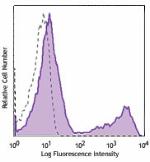
Human peripheral blood lymphocytes were stained with purifie... -
Alexa Fluor® 488 anti-human CD197 (CCR7)
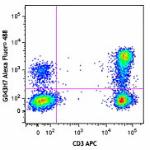
Human peripheral blood lymphocytes were stained with CD3 APC... 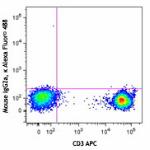
-
Brilliant Violet 421™ anti-human CD197 (CCR7)
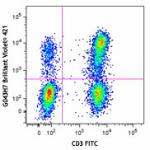
Human peripheral blood lymphocytes were stained with CD3 FIT... 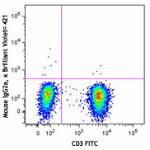
-
PE anti-human CD197 (CCR7)
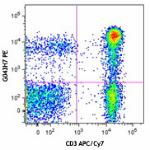
Human peripheral blood lymphocytes were stained with CD3 APC... 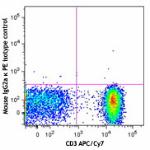
-
APC/Cyanine7 anti-human CD197 (CCR7)

Human peripheral blood lymphocytes were stained with CD3 FIT... -
Pacific Blue™ anti-human CD197 (CCR7)
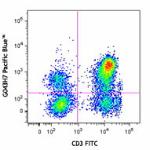
Human peripheral blood lymphocytes were stained with CD197 (... 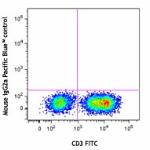
-
APC anti-human CD197 (CCR7)
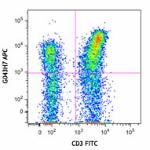
Human peripheral blood lymphocytes were stained with CD3 FIT... 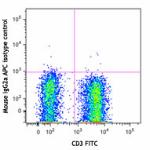
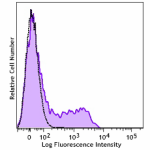
APC anti-human CD197 (CCR7) Antibody Cynomolgus monkey peri... 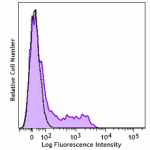
Rhesus macaque peripheral blood lymphocytes were stained wit... -
FITC anti-human CD197 (CCR7)
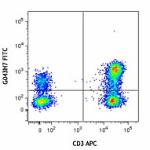
Human peripheral blood lymphocytes were stained with CD3 APC... 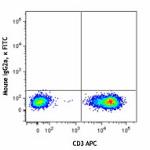
-
Alexa Fluor® 647 anti-human CD197 (CCR7)
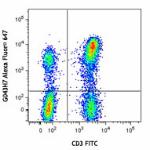
Human peripheral blood lymphocytes were stained with CD3 FIT... 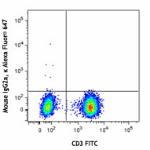
-
PerCP/Cyanine5.5 anti-human CD197 (CCR7)

Human peripheral blood leucocytes were stained with CD3 FITC... -
Brilliant Violet 605™ anti-human CD197 (CCR7)
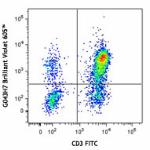
Human peripheral blood lymphocytes were stained with CD3 FIT... -
PE/Cyanine7 anti-human CD197 (CCR7)

Human peripheral blood lymphocytes were stained with CD3 FIT... -
Brilliant Violet 711™ anti-human CD197 (CCR7)
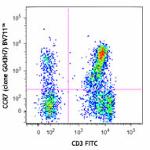
Human peripheral blood lymphocytes were stained with CD3 FIT... -
Brilliant Violet 785™ anti-human CD197 (CCR7)
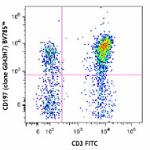
Human peripheral blood lymphocytes were stained with CD3 FIT... -
Brilliant Violet 510™ anti-human CD197 (CCR7)
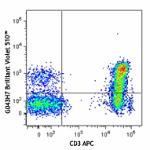
Human peripheral blood lymphocytes were stained with CD3 APC... 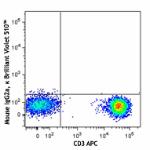
-
Brilliant Violet 650™ anti-human CD197 (CCR7)
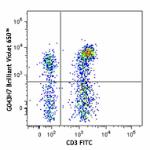
Human peripheral blood lymphocytes were stained with CD3 FIT... 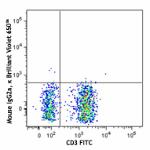
-
PE/Dazzle™ 594 anti-human CD197 (CCR7)
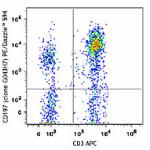
Human peripheral blood lymphocytes were stained with CD3 APC... 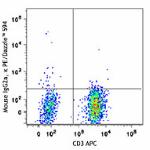
-
Biotin anti-human CD197 (CCR7)
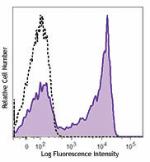
Human peripheral blood lymphocytes were stained with biotiny... -
Purified anti-human CD197 (CCR7) (Maxpar® Ready)
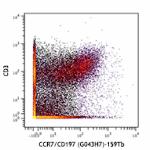
Human PBMCs stained with 170Er-anti-CD3 (UCHT1) and 159Tb-an... -
PerCP anti-human CD197 (CCR7)
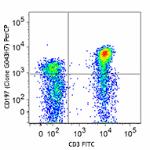
Human peripheral blood lymphocytes were stained with CD3 FIT... 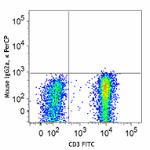
-
Alexa Fluor® 700 anti-human CD197 (CCR7)
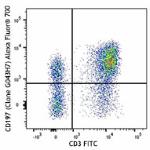
Human peripheral blood lymphocytes were stained with CD3 FIT... 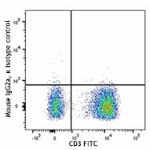
-
APC/Fire™ 750 anti-human CD197 (CCR7)

Human peripheral blood lymphocytes were stained with CD3 FIT... -
TotalSeq™-A0148 anti-human CD197 (CCR7)
-
TotalSeq™-B0148 anti-human CD197 (CCR7)
-
TotalSeq™-C0148 anti-human CD197 (CCR7)
-
Brilliant Violet 750™ anti-human CD197 (CCR7)

Human peripheral blood lymphocytes were stained with CD3 FIT... -
Ultra-LEAF™ Purified anti-human CD197 (CCR7)
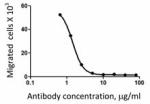
Chemotaxis of human CCR7-transfected BaF3 cells was performe... -
Spark NIR™ 685 anti-human CD197 (CCR7)

Human peripheral blood lymphocytes were stained with CD3 FIT... -
KIRAVIA Blue 520™ anti-human CD197 (CCR7)

Human peripheral blood lymphocytes were stained with CD3 APC... -
PE/Fire™ 640 anti-human CD197 (CCR7)

Human peripheral blood lymphocytes were stained with CD3 FIT... -
Spark YG™ 581 anti-human CD197 (CCR7)

Human peripheral blood lymphocytes were stained with anti-hu... -
APC/Fire™ 810 anti-human CD197 (CCR7) Antibody

Human peripheral blood lymphocytes were stained with anti-hu... -
TotalSeq™-D0148 anti-human CD197 (CCR7)
-
PE/Fire™ 810 anti-human CD197 (CCR7) Antibody

Human peripheral blood lymphocytes were stained with anti-hu... -
PE/Cyanine5 anti-human CD197 (CCR7)

Human peripheral blood lymphocytes were stained with CD3 FIT... -
Spark YG™ 593 anti-human CD197 (CCR7)

Human peripheral blood lymphocytes were stained with anti-hu... -
PE/Fire™ 744 anti-human CD197 (CCR7)

Human peripheral blood lymphocytes were stained with anti-hu... -
Spark Red™ 718 anti-human CD197 (CCR7) (Flexi-Fluor™)
 Login / Register
Login / Register 






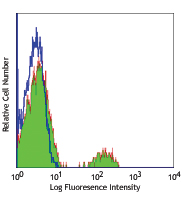
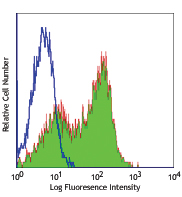
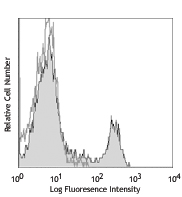
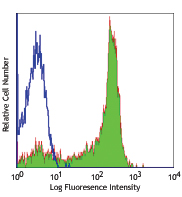



Follow Us